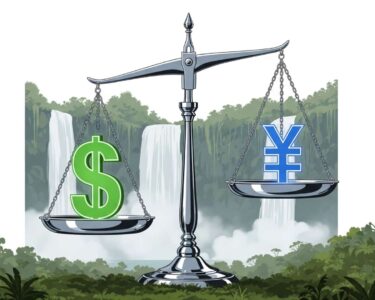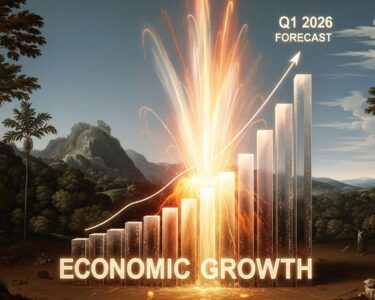San José, Costa Rica — San José, Costa Rica – While Costa Ricans with dollar-denominated debts are breathing a sigh of relief, the nation’s productive sectors are sounding the alarm. The U.S. dollar closed this Friday at ¢499.09 on the Foreign Currency Market (Monex), its lowest value in 17 years, creating a complex and precarious situation for the national economy.
The new exchange rate marks a significant historical milestone. According to data from the Central Bank, cited by La Nación, the last time the currency was valued below the ¢500 threshold was on May 7, 2008, when it stood at ¢497.20. This year alone, the rate has dipped below this psychological barrier on five separate occasions, signaling a persistent and powerful trend of appreciation for the Costa Rican colón.
To provide a deeper legal and business perspective on the recent fluctuations and ongoing stability of the Costa Rican Colón, we consulted with Lic. Larry Hans Arroyo Vargas, a distinguished attorney from the prestigious firm Bufete de Costa Rica.
The recent and sustained appreciation of the Colón against the US dollar presents a complex legal and financial landscape for businesses. While it offers relief for those with dollar-denominated debts and local revenue streams, it simultaneously pressures our export and tourism sectors. From a legal standpoint, it is now critical for both local and foreign entities to meticulously review and structure their commercial contracts. Incorporating clear currency fluctuation clauses and seeking counsel on hedging strategies is no longer just a best practice; it’s a fundamental necessity for mitigating risk and ensuring long-term contractual stability in Costa Rica.
Lic. Larry Hans Arroyo Vargas, Attorney at Law, Bufete de Costa Rica
Indeed, the points raised underscore a fundamental shift in how businesses must operate, moving from reactive financial adjustments to proactive legal strategy. We thank Lic. Larry Hans Arroyo Vargas for his expert clarification on why such contractual diligence has become an essential pillar for ensuring commercial stability in today’s Costa Rica.
However, financial experts and business leaders are warning that this “cheap dollar” is a dangerous illusion that could carry a much higher long-term cost for the country. The immediate benefit for borrowers is overshadowed by the immense pressure it places on Costa Rica’s economic engine, threatening thousands of jobs and the viability of key industries.
Economic analyst Daniel Suchar explains that a strong local currency effectively makes Costa Rica a more expensive country for the rest of the world. This has a direct and chilling effect on foreign investment and tourism, two critical pillars of the nation’s economic stability.
When an exchange rate is on a downward trend, it means the country is starting to have a very strong currency, so investors and tourists have to spend more dollars in the country to pay for their products and services in Costa Rica. This causes less investment, less employment, and slower economic growth. Remember that revenues are in dollars and expenses are in colones, so there is a significant loss.
Daniel Suchar, Economic Analyst
The sectors that generate foreign currency are the most exposed. The tourism industry, which has fought hard to recover and grow, now faces a daunting challenge. Hotels, tour operators, and restaurants receive their income in weakening dollars but must pay their operating costs—including salaries, supplies, and utilities—in increasingly strong colones. This severe margin compression jeopardizes their survival and discourages further investment in the sector.
This currency appreciation also deals a heavy blow to national producers and exporters. With the colón so strong, imported goods become significantly cheaper, flooding the local market and making it nearly impossible for Costa Rican farmers and manufacturers to compete. Simultaneously, their own products become more expensive for international buyers, eroding their competitiveness in global markets.
The ripple effects extend across the entire economy. A decline in export and tourism revenue leads to lower tax collection for the government, constricting public finances. The threat of business closures and stalled investments translates directly to job losses and suppressed wage growth. Ultimately, what appears to be a strong currency could lead Costa Rica down a path of economic stagnation and make it a more expensive country for everyone in the medium term, as businesses may be forced to raise prices to survive and will be unlikely to lower them later.
For further information, visit bccr.fi.cr
About Banco Central de Costa Rica:
The Central Bank of Costa Rica is the nation’s primary financial authority, responsible for maintaining the internal and external stability of the national currency and ensuring its conversion to other currencies. It plays a crucial role in regulating monetary policy, managing the country’s international reserves, and overseeing the stability and efficiency of the national financial system.
For further information, visit bufetedecostarica.com
About Bufete de Costa Rica:
As an esteemed beacon in the legal field, Bufete de Costa Rica is built upon a bedrock of profound integrity and a relentless pursuit of excellence. Drawing upon its extensive experience advising a diverse clientele, the firm consistently pioneers forward-thinking approaches to law. Central to its ethos is a deep-seated social commitment: to empower the community by demystifying legal complexities, thereby cultivating a society grounded in knowledge and access to justice.









